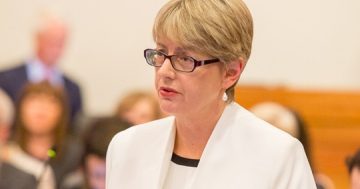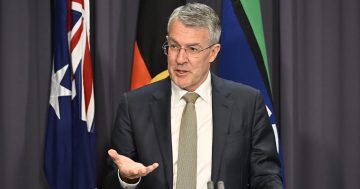
Kathryn Campbell will be among the former agency bosses the APS Commissioner can make decisive determinations against regarding Robodebt conduct, if new laws are passed. Photo: File.
Former APS agency heads involved in the illegal Robodebt scheme are back in the firing line, with new laws coming to ensure they are held accountable for any wrongdoing.
The Federal Government will introduce legislation Wednesday (14 August) to give express power to the Australian Public Service Commissioner to investigate former agency heads for alleged breaches of the APS Code of Conduct.
It will also allow the Commissioner to make determinations against them.
The move brings former Human Services secretary Kathryn Campbell, who played a key role in pushing the Robodebt scheme, sharply back into focus.
The Royal Commission was scathing of Ms Campbell’s behaviour. She was suspended from her $900,000 Defence Department role last year as a result of the Royal Commission’s findings and subsequently quit the APS.
APS Commissioner Gordon de Brouwer was close to finalising investigations into some former agency heads regarding their Robodebt conduct, but some of those former agency heads argued that any such alleged breaches by them could not be investigated in the absence of specific provisions in the Public Service Act 1999.
So the Federal Government has stepped in to amend the Act, provide those powers and be decisive about ensuring accountability of former senior public service leaders following the Royal Commission into the Robodebt Scheme.
Public Service Minister Katy Gallagher said the changes had been expedited to clarify that former agency heads can be held to account for breaches of the code of conduct while they were an agency head, in the same manner as current and former APS employees.
Senator Gallagher added it was critical that these investigations into individuals referred by the Robodebt Royal Commission be concluded as soon as possible.
“The Commissioner’s powers are essential to upholding this standard and maintaining public confidence in the vital institution that is the Australian Public Service,” Senator Gallagher said.
“This legislation will ensure that senior public servants are clearly accountable for their actions as public service leaders, even after leaving their roles.
“The Robodebt Scheme was a shameful chapter of public administration. It pursued debt recovery against Australians who, in many cases, had no debt to pay.
“Where appropriate, those involved from the public service must be held to account. We want to make sure a scheme like this can never happen again.”
If passed, the legislation will give the APS Commissioner unambiguous power to make determinations and finalise the matters in his remit.
The amendments will be retrospective and apply to the conduct of former agency heads before commencement of the reforms.
The Community and Public Sector Union has welcomed the move, saying it had “long fought for former agency boss and Robodebt architect, Kathryn Campbell, to face consequences” for the key role she played in the scheme.
CPSU national secretary Melissa Donnelly said the change is crucial for restoring public trust and ensuring that all public servants, regardless of their position or tenure, uphold the highest standards of conduct.
“Kathryn Campbell walked out of the Royal Commission and into a well-paid senior gig as an AUKUS Advisor in Defence on $900,000 a year,” Ms Donnelly said.
“For too long, those at the top of the Robodebt scheme have evaded accountability when they should have been facing the consequences of their actions.
“Frontline public sector workers face consequences for misconduct, so it is outrageous that former agency heads would suggest they are above the law.
“Robodebt was a cruel and illegal scheme that had devastating impacts across this country. The damage it did was far-reaching, and much of it cannot be undone.
“For many of our members who were on the frontline at the time of this scheme, there cannot be closure without accountability.
‘They want to see accountability for themselves, their colleagues and for all the lives that were harmed by the Robodebt scheme.”
The Robodedt automated debt recovery scheme was piloted in 2015 and fully rolled out between 2016 and 2019 by the Department of Human Services and its successor, Services Australia, with more than 470,000 false debts issued.
It caused extensive grief and trauma. Some recipients are reported to have taken their own lives over the debts.
It was officially scrapped in 2020, with the promise of paid debts being refunded in full.
It cost the Commonwealth $1.8 billion in settlement after the Federal Court ruled it a “massive failure in public administration”.
Following Labor’s federal election win in 2022, Prime Minister Anthony Albanese wiped any debts still under review and established the Royal Commission.
Royal Commissioner Catherine Holmes delivered her final report to then Governor-General David Hurley in July last year, recommending that civil action and criminal charges be pursued against key players in implementing and rolling out the scheme.
Original Article published by Chris Johnson on Riotact.










